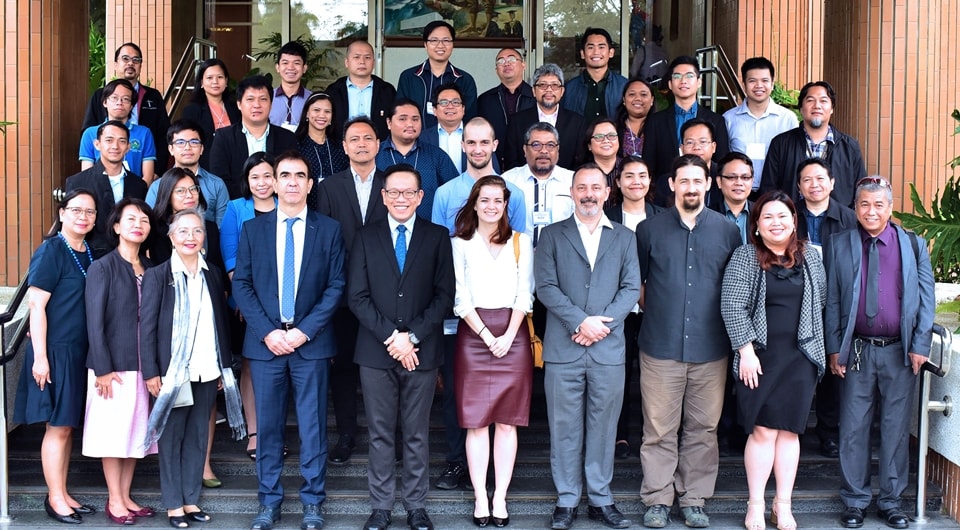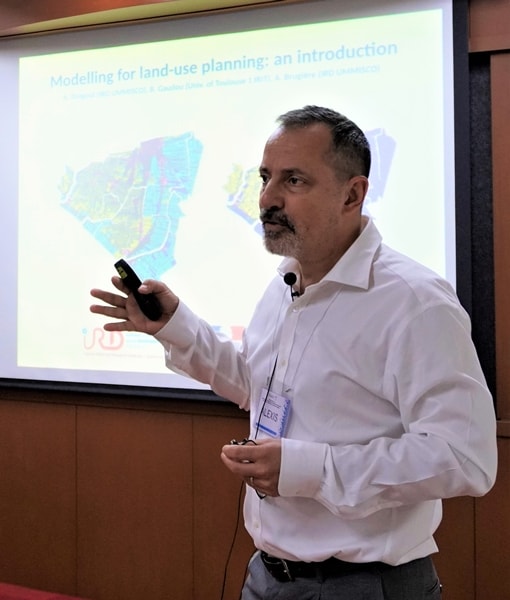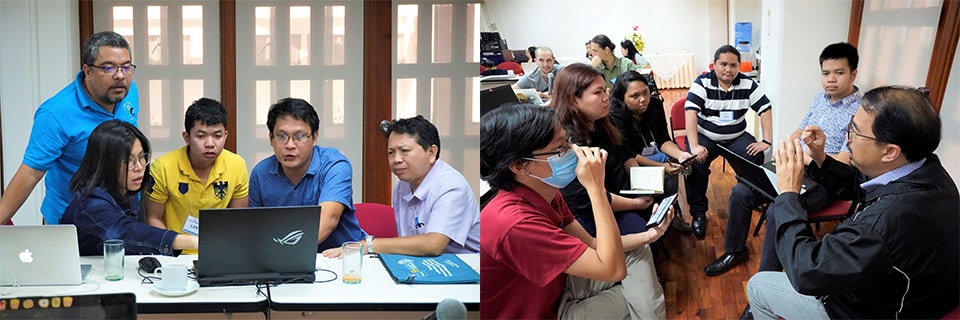 Training workshop participants and resource persons from IRD with Mr. Jean-Jacques Forte, Cultural and Cooperation Counsellor, Embassy of France in the Philippines (first row, 4th from left) and Mr. Joselito G. Florendo, SEARCA Deputy Director for Administration (first row, 5th from left).
Training workshop participants and resource persons from IRD with Mr. Jean-Jacques Forte, Cultural and Cooperation Counsellor, Embassy of France in the Philippines (first row, 4th from left) and Mr. Joselito G. Florendo, SEARCA Deputy Director for Administration (first row, 5th from left).
The Southeast Asian Regional Center for Graduate Study and Research in Agriculture (SEARCA), together with the French National Research Institute for Sustainable Development (IRD), spearheaded the Training Workshop on Modeling Using Geographic Information Systems (GIS) and Agent-based Modeling Applications (GAMA) held 10-14 February 2020 at SEARCA Headquarters, Los Baños, Laguna.
GAMA is an open-source platform developed by an international consortium of research teams under the IRD/Sorbonne Université International Research Unit UMMISCO (Unité de Modélisation Mathématique et Informatique de Systèmes Complexes). GAMA integrates a dedicated modeling language and provides a simulation development environment that allow modelers to build spatially-explicit, multi-agent simulations that can be used for a wide array of applications, including land-use planning and management, agriculture and forestry, ecology, traffic engineering, public health, and disaster risk management.
The training workshop gathered 25 participants composed of faculty members, researchers, and graduate students from the University of the Philippines Los Baños (UPLB), plus a researcher of the National Fisheries Research and Development Institute and a graduate student at Ateneo de Manila University. The learning activity aimed to enable participants to discover and understand environmental threats through the design of models of increasing complexity under different economic or climatic scenarios and adaptation planning; and build on these models to explore and compare realistic strategies of adaptation at the individual, collective, or institutional scales. For this training session, focus was devoted to the application of GAMA in investigating phenomena of concern related to environment and agriculture, particularly in exploring and designing adaptation strategies to address salinity intrusion in the Vietnamese Mekong Delta.
Speaking on behalf of SEARCA Director Dr. Glenn B. Gregorio, Mr. Joselito G. Florendo, SEARCA's Deputy Director for Administration, emphasized that the GAMA platform could provide participants with insights and valuable information in developing information-based strategies and policy regulations to address common concerns regarding the environment, agriculture and forestry, and disaster risk reduction, among others. He added that the training workshop is the latest among the many collaborative capacity-building activities and research projects initiated by SEARCA in partnership with the Embassy of France in the Philippines.
In his message, Mr. Jean-Jacques Forte, Cultural and Cooperation Counsellor of the Embassy of France in the Philippines, said that the tools learned from the training workshop are important not only because these involve highly theoretical concepts but also because these showcase concrete applications of agent-based modeling that participants could adopt in their own field of specialization.
 Dr. Alexis Drogoul, Vietnam-Philippines Country Representative of IRD, discusses the use of agent-based modeling applications in land-use planning.Providing an overview of the training workshop, Dr. Alexis Drogoul, Vietnam-Philippines Country Representative of IRD, said that aside from exploring the use of computer-based methodologies to model and simulate complex systems related to agriculture, especially in using these tools to support decisions of land-use planners amid threats such as climate change and salinization, the training workshop could also provide opportunities to discuss common research projects.
Dr. Alexis Drogoul, Vietnam-Philippines Country Representative of IRD, discusses the use of agent-based modeling applications in land-use planning.Providing an overview of the training workshop, Dr. Alexis Drogoul, Vietnam-Philippines Country Representative of IRD, said that aside from exploring the use of computer-based methodologies to model and simulate complex systems related to agriculture, especially in using these tools to support decisions of land-use planners amid threats such as climate change and salinization, the training workshop could also provide opportunities to discuss common research projects.
The training workshop was designed to facilitate discussions on the fundamental theoretical underpinnings of GAMA modeling between participants and trainers, and then apply the tools learned in working on a concrete case study involving the interplay between shifting land use and various socio-environmental factors (e.g., farmer's behaviors, seawater intrusion) in the Ben Tre province in the Mekong Delta. The first two days of the workshop involved discussions on basic concepts governing the GAMA platform, including its main features and real-life applications, followed by a walk-through of the GAMA modeling process using Schelling's segregation model as illustrative example. The final lectures included discussions on building the environment, incorporating decisions and interactions of agents, and designing simulations and experiments in GAMA. The last three days were then devoted to a facilitated workshop wherein participants were tasked to design and write models based on different scenarios.
Dr. Benoit Gaudou, researcher at IRD's UMMISCO Lab, and Mr. Arthur Brugière, Data Analysis and Computer Modeling Engineer at IRD Vietnam, joined Dr. Drogoul as resource persons for the lectures and as facilitators for the hands-on workshop. Meanwhile, Dr. Nathaniel C. Bantayan, Professor of Forest Management at the Institute of Renewable Natural Resources, College of Forestry and Natural Resources, UPLB, and Dr. Maria Art Antonette D. Clariño, Associate Professor at the Institute of Computer Science, College of Arts and Sciences, UPLB, served as technical coordinators of the training workshop.
 During the hands-on session, participants brainstorm on how to apply GAMA modeling in understanding changes in land use in Ben Tre province in the Mekong Delta, as well as in designing models to explore adaptation strategies given different scenarios.
During the hands-on session, participants brainstorm on how to apply GAMA modeling in understanding changes in land use in Ben Tre province in the Mekong Delta, as well as in designing models to explore adaptation strategies given different scenarios.